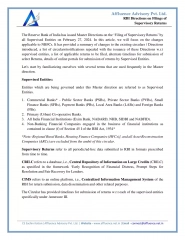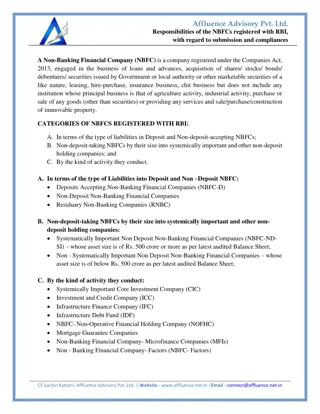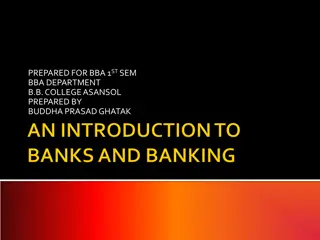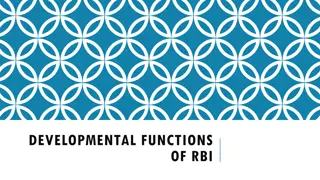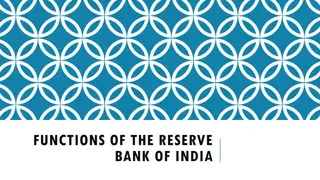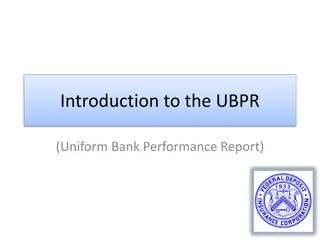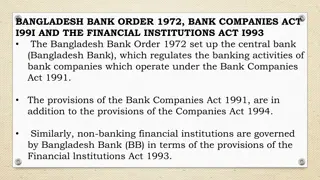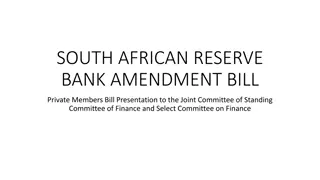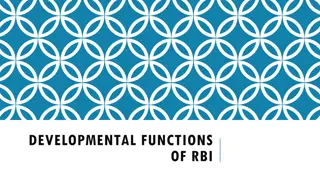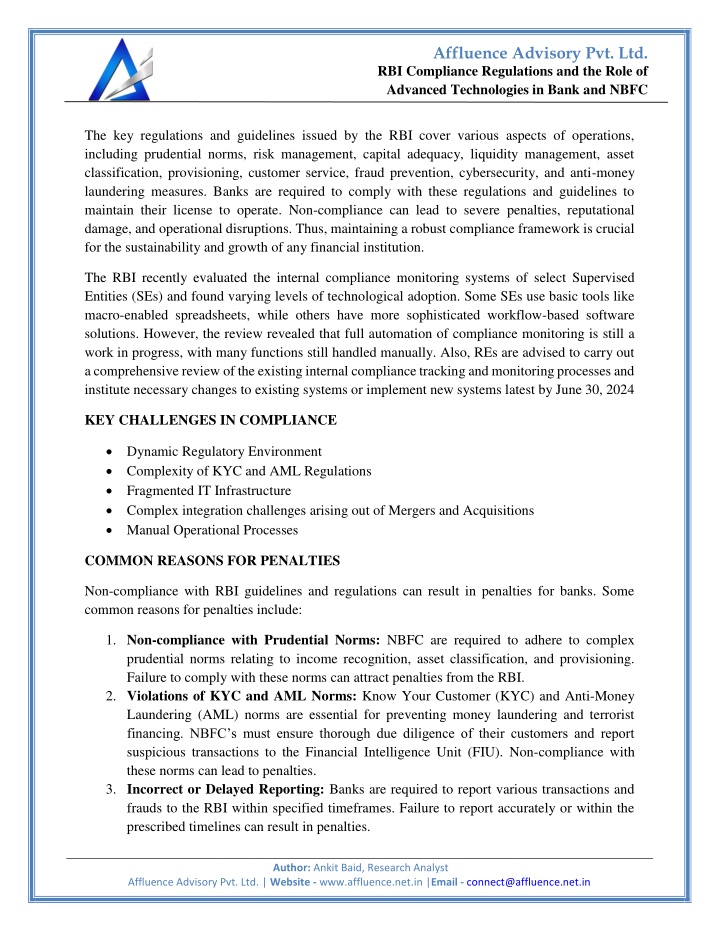
RBI Compliance Regulations and the Role of Advanced Technologies in Bank
Technological solutions play a pivotal role in enhancing compliance management for NBFCs. By leveraging tech solutions for suspicious transaction detection, RPA for automating compliance tasks, blockchain for secure record-keeping, NLP for regulatory
Download Presentation

Please find below an Image/Link to download the presentation.
The content on the website is provided AS IS for your information and personal use only. It may not be sold, licensed, or shared on other websites without obtaining consent from the author. If you encounter any issues during the download, it is possible that the publisher has removed the file from their server.
You are allowed to download the files provided on this website for personal or commercial use, subject to the condition that they are used lawfully. All files are the property of their respective owners.
The content on the website is provided AS IS for your information and personal use only. It may not be sold, licensed, or shared on other websites without obtaining consent from the author.
E N D
Presentation Transcript
Affluence Advisory Pvt. Ltd. RBI Compliance Regulations and the Role of Advanced Technologies in Bank and NBFC The key regulations and guidelines issued by the RBI cover various aspects of operations, including prudential norms, risk management, capital adequacy, liquidity management, asset classification, provisioning, customer service, fraud prevention, cybersecurity, and anti-money laundering measures. Banks are required to comply with these regulations and guidelines to maintain their license to operate. Non-compliance can lead to severe penalties, reputational damage, and operational disruptions. Thus, maintaining a robust compliance framework is crucial for the sustainability and growth of any financial institution. The RBI recently evaluated the internal compliance monitoring systems of select Supervised Entities (SEs) and found varying levels of technological adoption. Some SEs use basic tools like macro-enabled spreadsheets, while others have more sophisticated workflow-based software solutions. However, the review revealed that full automation of compliance monitoring is still a work in progress, with many functions still handled manually. Also, REs are advised to carry out a comprehensive review of the existing internal compliance tracking and monitoring processes and institute necessary changes to existing systems or implement new systems latest by June 30, 2024 KEY CHALLENGES IN COMPLIANCE Dynamic Regulatory Environment Complexity of KYC and AML Regulations Fragmented IT Infrastructure Complex integration challenges arising out of Mergers and Acquisitions Manual Operational Processes COMMON REASONS FOR PENALTIES Non-compliance with RBI guidelines and regulations can result in penalties for banks. Some common reasons for penalties include: 1.Non-compliance with Prudential Norms: NBFC are required to adhere to complex prudential norms relating to income recognition, asset classification, and provisioning. Failure to comply with these norms can attract penalties from the RBI. 2.Violations of KYC and AML Norms: Know Your Customer (KYC) and Anti-Money Laundering (AML) norms are essential for preventing money laundering and terrorist financing. NBFC s must ensure thorough due diligence of their customers and report suspicious transactions to the Financial Intelligence Unit (FIU). Non-compliance with these norms can lead to penalties. 3.Incorrect or Delayed Reporting: Banks are required to report various transactions and frauds to the RBI within specified timeframes. Failure to report accurately or within the prescribed timelines can result in penalties. Author: Ankit Baid, Research Analyst Affluence Advisory Pvt. Ltd. | Website - www.affluence.net.in |Email - connect@affluence.net.in
Affluence Advisory Pvt. Ltd. RBI Compliance Regulations and the Role of Advanced Technologies in Bank and NBFC 4.Conflict of Interest: Banks should avoid sanctioning loans or engaging in financial transactions that involve conflicts of interest, such as lending to companies where their directors have personal interests. Such actions can attract penalties. 5.Non-Adherence to Customer Service Standards: Banks must follow the RBI's guidelines on customer service, including fair practices, grievance redressal mechanisms, and adherence to the code of conduct for recovery agents. Failure to comply with these standards can lead to penalties. ICICI Bank Violations Fine of 12.38 Cr Loan Sanctions: Issued loans to companies with common directors, creating conflicts of interest. Non-Financial Products: Sold products outside permissible banking activities. Fraud Reporting: Failed to report frauds to the RBI on time. Kotak Mahindra Bank Violations Fine of 3.95 Cr Service Provider Review: Did not conduct required annual reviews and due diligence. Customer Contact: Contacted customers outside specified hours. Interest Charges: Levied interest from the disbursement due date instead of the actual date. Foreclosure Charges: Imposed charges without a prepayment penalty clause. SOLUTIONS TO AVOID PENALTIES Banks can take several measures to avoid penalties and ensure compliance with RBI guidelines. Some solutions include: Strengthening Internal Audit and Compliance Mechanisms: Banks should establish robust internal audit and compliance functions to monitor and ensure adherence to RBI guidelines. Regular audits can help identify any non-compliance issues and take corrective actions promptly. Robust Risk Management and Due Diligence leveraging technology: Banks should automate effective risk management frameworks in place to identify and address potential risks. Due diligence processes should be strengthened to ensure that loans and transactions are sanctioned after proper evaluation and in line with regulatory requirements. Timely and Automated Reporting: Banks must ensure timely and accurate reporting of transactions, frauds, and other relevant information to the RBI. This includes implementing AI powered solutions for customer verification, RT-Transaction Monitoring and risk assessment Author: Ankit Baid, Research Analyst Affluence Advisory Pvt. Ltd. | Website - www.affluence.net.in |Email - connect@affluence.net.in
Affluence Advisory Pvt. Ltd. RBI Compliance Regulations and the Role of Advanced Technologies in Bank and NBFC Training: Banks can benefit from engaging with regulatory experts and training employees who can provide guidance on compliance requirements. Periodic reviews by external experts can help identify areas of improvement and ensure compliance with RBI guidelines. THE ROLE OF TECHNOLOGY IN ENSURING COMPLIANCE Technology plays a significant role in helping banks ensure compliance with RBI regulations. The adoption of advanced compliance software and tools can automate compliance processes, monitor transactions in real-time, and generate accurate reports. Artificial Intelligence (AI) and machine learning can be utilized to detect suspicious transactions and patterns, reducing the risk of non- compliance. Blockchain technology can provide transparent and tamper-proof transaction records, enhancing accountability and regulatory compliance. AI AND MACHINE LEARNING FOR SUSPICIOUS TRANSACTION DETECTION AI and machine learning (ML) algorithms can analyze large volumes of transaction data to detect patterns indicative of fraudulent or suspicious activities. These technologies learn from historical data and continuously improve their accuracy in identifying potential money laundering or fraud. NBFCs can use these systems to: Monitor Transactions in Real-Time: AI-driven systems can flag unusual transactions based on predefined rules and patterns, allowing compliance teams to investigate promptly. Predictive Analysis: Machine learning models can predict potential compliance breaches based on trends and anomalies in transaction data, enabling proactive risk management. ROBOTIC PROCESS AUTOMATION (RPA) FOR AUTOMATING COMPLIANCE TASKS RPA can automate repetitive compliance tasks such as data entry, customer due diligence, and regulatory reporting. This reduces manual effort, minimizes errors, and speeds up compliance processes. For example: Automated KYC Verification: RPA bots can handle KYC document verification and validation, ensuring that all customer information is accurately captured and updated in real-time. Regulatory Reporting: RPA can automate the generation and submission of regulatory reports, ensuring timely and accurate compliance with reporting requirements. Author: Ankit Baid, Research Analyst Affluence Advisory Pvt. Ltd. | Website - www.affluence.net.in |Email - connect@affluence.net.in
Affluence Advisory Pvt. Ltd. RBI Compliance Regulations and the Role of Advanced Technologies in Bank and NBFC Also loan sanctioning and related queries and delinquency tracking can be handled by the automated system apart from the major suspicious transaction that would be notified to the concerned authority. (In this case, the models will have to be trained) BLOCKCHAIN FOR SECURE AND TRANSPARENT RECORD-KEEPING Blockchain technology provides a decentralized and immutable ledger for recording transactions and compliance-related activities. This ensures data integrity and transparency, which is crucial for regulatory compliance. NBFCs can use blockchain to: Track Transactions: Record every transaction on a blockchain to create a transparent and tamper-proof trail that can be audited by regulatory authorities. Smart Contracts: Implement smart contracts to automate compliance processes such as loan disbursements and repayments, ensuring that all actions are executed according to regulatory standards. NATURAL LANGUAGE PROCESSING (NLP) FOR REGULATORY CHANGE MANAGEMENT NLP can automate the extraction and analysis of regulatory information from legal texts, ensuring that compliance teams are promptly informed of relevant changes. This technology helps NBFCs: Stay Updated with Regulatory Changes: NLP tools can scan regulatory websites, news, and legal documents to identify changes and updates that impact compliance. Automated Policy Updates: Use NLP to automatically update internal compliance policies and procedures based on the latest regulatory requirements. CENTRALIZED DATA MANAGEMENT PLATFORMS Integrating data across various systems into a centralized platform facilitates comprehensive compliance analysis and proactive risk management. These platforms enable NBFCs to: Consolidate Compliance Data: Bring together data from different departments and systems into a single repository for easier monitoring and analysis. Enhanced Reporting: Generate comprehensive compliance reports that provide a holistic view of compliance status across the organization. ADVANCED ANALYTICS FOR RISK MANAGEMENT Advanced analytics tools can help NBFCs identify and assess risks more effectively. By analyzing various data points, these tools can provide insights into potential compliance issues and help in making informed decisions. For example: Author: Ankit Baid, Research Analyst Affluence Advisory Pvt. Ltd. | Website - www.affluence.net.in |Email - connect@affluence.net.in
Affluence Advisory Pvt. Ltd. RBI Compliance Regulations and the Role of Advanced Technologies in Bank and NBFC Risk Scoring: Assign risk scores to customers and transactions based on various factors, helping compliance teams prioritize their efforts. Scenario Analysis: Use predictive analytics to simulate different scenarios and assess the potential impact of regulatory changes on compliance. Technological solutions play a pivotal role in enhancing compliance management for NBFCs. By leveraging tech solutions for suspicious transaction detection, RPA for automating compliance tasks, blockchain for secure record-keeping, NLP for regulatory change management, centralized data management platforms, and advanced analytics for risk management, NBFCs can ensure robust compliance with regulatory requirements. These technologies not only improve efficiency but also provide a proactive approach to managing compliance risks, thereby safeguarding the integrity and stability of the financial system. Disclaimer:This article provides general information existing at the time of preparation and we take no responsibility to update it with the subsequent changes in the law. The article is intended as a news update and Affluence Advisory neither assumes nor accepts any responsibility for any loss arising to any person acting or refraining from acting as a result of any material contained in this article. It is recommended that professional advice be taken based on specific facts and circumstances. This article does not substitute the need to refer to the original pronouncement Author: Ankit Baid, Research Analyst Affluence Advisory Pvt. Ltd. | Website - www.affluence.net.in |Email - connect@affluence.net.in

